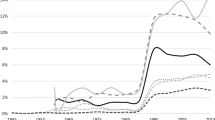Abstract
This special issue is a product of the international symposium on “ICT, Activities, Time Use and Travel” that was hosted by Nanjing University from 16 to 18 July 2016. The symposium brought together leading scholars from all over the world to congregate with Chinese scholars and students and to share and discuss the research frontiers at this nexus. It was motivated by a recognition of the changing goals and scope of Information and Communications Technology (ICT) research in conjunction with the development of new ICTs and the emergence of new ICT-enabled behaviors. Consequently, the symposium and later this special issue have drawn together significant scholarly contributions that provide new behavioral insights as well as new theoretical and methodological advances. The symposium culminated in three roundtable panel discussions addressing the following cross-cutting themes: (1) time use while travelling (led by Glenn Lyons); (2) ICT and travel behavior (led by Pat Mokhtarian); and (3) Big Data, activities and urban space (led by Eran Ben-Elia). In this epilogue to the special issue we offer a distillation of these discussions.
Similar content being viewed by others
References
Ben-Elia, E., et al.: Activity fragmentation, ICT and travel: an exploratory path analysis of spatiotemporal interrelationships. Transp. Res. Part A: Policy Pract. 68, 56–74 (2014)
Breiman, L.: Statistical modeling: two cultures. Stat. Sci. 16(3), 199–231 (2001). (Also see the comments following this article, in the same issue)
Brownstone, D., Bunch, D.S., Train, K.: Joint mixed logit models of stated and revealed preferences for alternative-fuel vehicles. Transp. Res. Part B: Methodol. 34(5), 315–338 (2000)
Cao, X., Mokhtarian, P.L., Handy, S.L.: Examining the impacts of residential self-selection on travel behaviour: a focus on empirical findings. Transp. Rev. 29(3), 359–395 (2009)
Couclelis, H.: Rethinking time geography in the information age. Environ. Plan. A 41(7), 1556–1575 (2009)
Engeström, Y., Miettinen, R., Punamäki, R.-L. (eds.): Perspectives on Activity Theory. Cambridge University Press, Cambridge (1999)
Ericsson: Mobility Report. https://www.ericsson.com/res/docs/2016/ericsson-mobility-report-2016.pdf (2016). Accessed 28 July 2017
Gripsrud, M., Hjorthol, R.: Working on the train: from ‘dead time’ to productive and vital time. Transportation 39, 941–956 (2012)
Hägerstrand, T.: What about people in regional science? Reg. Sci. Assoc. Pap. 24(1), 7–21 (1970)
Lyons, G., Urry, J.: Travel time use in the information age. Transp. Res. Part A 39, 257–276 (2005)
Lyons, G., Jain, J., Weir, I.: Changing times—a decade of empirical insight into the experience of rail passengers in Great Britain. J. Transp. Geogr. 57, 94–104 (2016)
Malokin, A., Mokhtarian, P.L., Circella, G.: An investigation of methods for imputing attitudes from one sample to another. School of Civil and Environmental Engineering, Georgia Institute of Technology. http://hdl.handle.net/1853/58418 (2017). Accessed 12 July 2017
Mokhtarian, P.L.: A typology of relationships between telecommunications and transportation. Transp. Res. Part A: Gen. 24(3), 231–242 (1990)
Mokhtarian, P.L.: Social networks and telecommunications. In: Kitamura, R., Yoshii, T., Yamamoto, T. (eds.) The Expanding Sphere of Travel Behaviour Research: Selected Papers from the 11th International Conference on Travel Behaviour Research, pp. 429–438. Emerald Group, Bingley (2009)
Mokhtarian, P.L., Salomon, I.: How derived is the demand for travel? Some conceptual and measurement considerations. Transp. Res. Part A 35, 695–719 (2001)
Mokhtarian, P.L., Tal, G.: Impacts of ICT on travel behavior: a tapestry of relationships. In: Rodrigue, J.-P., Notteboom, T., Shaw, J. (eds.) The Sage Handbook of Transport Studies, pp. 241–260. Sage Publications, London (2013)
Russell, M., Price, R., Signal, L., Stanley, J., Gerring, Z., Cumming, J.: What do passengers do during travel time? Structured observations on buses and trains. J. Public Transp. 14(3), 123–146 (2011)
Watt, L., Urry, J.: Moving methods: travelling times. Environ. Plan. D 26, 860–874 (2008)
Author information
Authors and Affiliations
Corresponding author
Rights and permissions
About this article
Cite this article
Ben-Elia, E., Lyons, G. & Mokhtarian, P.L. Epilogue: the new frontiers of behavioral research on the interrelationships between ICT, activities, time use and mobility. Transportation 45, 479–497 (2018). https://doi.org/10.1007/s11116-018-9871-x
Published:
Issue Date:
DOI: https://doi.org/10.1007/s11116-018-9871-x



